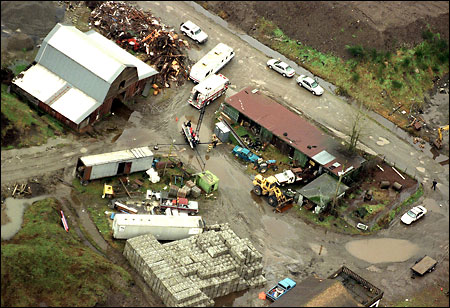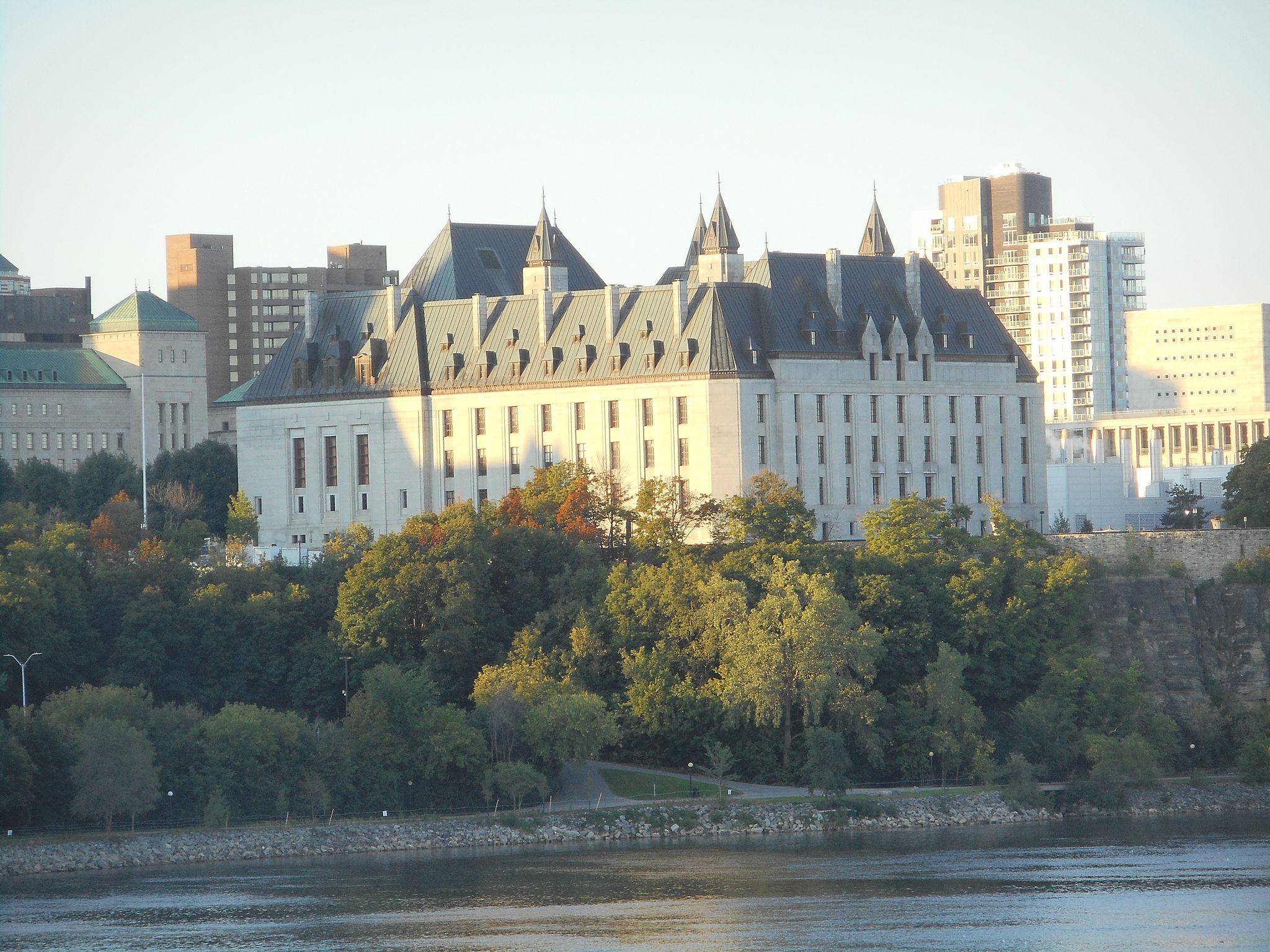Article
Robert Latimer Case
In 1993, Saskatchewan farmer Robert Latimer killed his severely disabled daughter Tracy. His prosecution for murder attracted national and international attention, and raised contentious issues concerning euthanasia.

Enter your search term
Signing up enhances your TCE experience with the ability to save items to your personal reading list, and access the interactive map.
Create AccountArticle
In 1993, Saskatchewan farmer Robert Latimer killed his severely disabled daughter Tracy. His prosecution for murder attracted national and international attention, and raised contentious issues concerning euthanasia.
"https://d2ttikhf7xbzbs.cloudfront.net/media/media/a7e37b63-d2cb-4615-8eeb-b832a758bcf2.jpg" // resources/views/front/categories/view.blade.phphttps://d2ttikhf7xbzbs.cloudfront.net/media/media/a7e37b63-d2cb-4615-8eeb-b832a758bcf2.jpg

Article
Between 1978 and 2001, at least 65 women disappeared from Vancouver’s Downtown Eastside. Robert Pickton, who operated a pig farm in nearby Port Coquitlam, was charged with murdering 26 of the women. He was convicted on six charges and sentenced to life in prison. In a jail cell conversation with an undercover police officer, Pickton claimed to have murdered 49 women. The murders led to the largest serial killer investigation in Canadian history, and Pickton’s farm became the largest crime scene in Canadian history. The case became a flash point in the wider issue of missing and murdered Indigenous women and girls in Canada. In 2012, a provincial government inquiry into the case concluded that “blatant failures” by police — including inept criminal investigative work, compounded by police and societal prejudice against sex trade workers and Indigenous women — led to a “tragedy of epic proportions.” Warning: This article contains sensitive material that may not be suitable for all audiences.
"https://d2ttikhf7xbzbs.cloudfront.net/media/media/a598869a-67b8-4009-b6a7-abf3d25c07ee.jpg" // resources/views/front/categories/view.blade.phphttps://d2ttikhf7xbzbs.cloudfront.net/media/media/a598869a-67b8-4009-b6a7-abf3d25c07ee.jpg

Article
In the early 1990s, Sue Rodriguez submitted to the courts that section 241(b) of the Criminal Code, which prohibited assisted suicide, was constitutionally invalid. (See also Assisted Suicide in Canada.) Rodriguez suffered from amyotrophic lateral sclerosis (ALS) and wanted the legal right to have a physician’s help in ending her own life. On 30 September 1993, a 5–4 majority of the Supreme Court of Canada upheld section 241(b), declaring that it was constitutional and did not violate the Canadian Charter of Rights and Freedoms. Nonetheless, Rodriguez committed suicide in February 1994, assisted by an anonymous doctor and in the presence of NDP MP Svend Robinson, who had championed her cause. In 2015, the Supreme Court decided unanimously to strike down the prohibition and allow medically assisted suicide, which was officially legalized with the passing of the Medical Assistance in Dying (MAID) Act on 17 June 2016. In March 2021, new legislation was passed that expanded eligibility for MAID. This article contains sensitive material that may not be suitable for all audiences.
"https://d2ttikhf7xbzbs.cloudfront.net/media/Twitter_Cards/supreme court.jpg" // resources/views/front/categories/view.blade.phphttps://d2ttikhf7xbzbs.cloudfront.net/media/Twitter_Cards/supreme court.jpg

Article
Romeo Phillion was the longest-serving prisoner in Canadian history to have a murder conviction overturned.
"https://d2ttikhf7xbzbs.cloudfront.net/media/media/60d763f2-60f1-49b9-ae90-ea3f0d0916ec.jpg" // resources/views/front/categories/view.blade.phphttps://d2ttikhf7xbzbs.cloudfront.net/media/media/60d763f2-60f1-49b9-ae90-ea3f0d0916ec.jpg

Article
In 1946, Maurice DUPLESSIS, then premier and attorney general of Qué, caused the Liquor Commission chairman to revoke the liquor licence of Frank Roncarelli, a Montréal restaurant owner, so ruining the restaurant.
"https://d2ttikhf7xbzbs.cloudfront.net/media/media/22180159-911b-4d85-94c5-fc2a39cd939d.jpg" // resources/views/front/categories/view.blade.phphttps://d2ttikhf7xbzbs.cloudfront.net/media/media/22180159-911b-4d85-94c5-fc2a39cd939d.jpg

Article
The Supreme Court, by a 5-4 majority, upheld (1953) the province of Québec's power, challenged by JEHOVAH'S WITNESS Laurier Saumur, to authorize municipalities to prohibit distribution, without police permission, of all publications in the streets.
"https://development.thecanadianencyclopedia.ca/images/tce_placeholder.jpg?v=e9dca980c9bdb3aa11e832e7ea94f5d9" // resources/views/front/categories/view.blade.phphttps://development.thecanadianencyclopedia.ca/images/tce_placeholder.jpg?v=e9dca980c9bdb3aa11e832e7ea94f5d9

Article
Pierre-Guillaume Sayer and three other Métis in the Red River Colony were brought to trial on 17 May 1849 in the General Quarterly Court of Assiniboia on charges of violating the Hudson's Bay Company's charter by illegally trafficking in furs.
"https://development.thecanadianencyclopedia.ca/images/tce_placeholder.jpg?v=e9dca980c9bdb3aa11e832e7ea94f5d9" // resources/views/front/categories/view.blade.phphttps://development.thecanadianencyclopedia.ca/images/tce_placeholder.jpg?v=e9dca980c9bdb3aa11e832e7ea94f5d9

Article
In the Schreiber case (1998), the majority of the Supreme Court of Canada held that an order requiring the seizure of bank documents, made by the Canadian minister of justice and despatched to the Swiss authorities, did not involve the application of the Canadian Charter of Rights and Freedoms and did not derogate from Article 8 of the Charter. The majority was of the opinion that the Charter did not apply to a foreign government....
"https://development.thecanadianencyclopedia.ca/images/tce_placeholder.jpg?v=e9dca980c9bdb3aa11e832e7ea94f5d9" // resources/views/front/categories/view.blade.phphttps://development.thecanadianencyclopedia.ca/images/tce_placeholder.jpg?v=e9dca980c9bdb3aa11e832e7ea94f5d9

Article
By virtue of par 94(2) of the Motor Vehicle Act of British Columbia, anyone who drives his vehicle without a valid permit or while his permit is suspended commits an infraction for which the minimum penalty is a prison sentence.
"https://development.thecanadianencyclopedia.ca/images/tce_placeholder.jpg?v=e9dca980c9bdb3aa11e832e7ea94f5d9" // resources/views/front/categories/view.blade.phphttps://development.thecanadianencyclopedia.ca/images/tce_placeholder.jpg?v=e9dca980c9bdb3aa11e832e7ea94f5d9

Article
The Quiet Revolution (1960–1970) gave rise to secularism within Quebec society. The latter became both secular by widening the separation between Church and State, as well as non-confessional by removing religion from institutions. However, the issue of secularism is still a matter for debate. In June 2019, the passage of the Act Respecting the Laicity of the State fueled many discussions about the place of religion in public domain.
"https://d2ttikhf7xbzbs.cloudfront.net/media/new_article_images/Corridart/1059px-Pierre_Ayot,_La_croix_du_Mont-Royal_(réplique),_2016_(30216916871).jpg" // resources/views/front/categories/view.blade.phphttps://d2ttikhf7xbzbs.cloudfront.net/media/new_article_images/Corridart/1059px-Pierre_Ayot,_La_croix_du_Mont-Royal_(réplique),_2016_(30216916871).jpg
,_2016_(30216916871).jpg)
Article
In the 1985 Singh case (Singh v. Minister of Employment and Immigration), the Supreme Court of Canada ruled that the legal guarantees of the Charter of Rights and Freedoms apply to “everyone” physically present in Canada, including foreign asylum seekers. The court also found that refugees have the right to a full oral hearing of their claims before being either admitted into the country or deported. The decision drastically changed the way refugees are dealt with in Canada. (See also Canadian Refugee Policy.)
"https://d2ttikhf7xbzbs.cloudfront.net/media/media/7ac02b0f-118b-4ccb-b6dc-81f218b68954.jpg" // resources/views/front/categories/view.blade.phphttps://d2ttikhf7xbzbs.cloudfront.net/media/media/7ac02b0f-118b-4ccb-b6dc-81f218b68954.jpg

Article
Sinnisiak (d c 1930) and Uluksuk (d 1924), Inuit hunters from the Coppermine region of the NWT, were the first Inuit to be tried for murder under Canadian law.
"https://development.thecanadianencyclopedia.ca/images/tce_placeholder.jpg?v=e9dca980c9bdb3aa11e832e7ea94f5d9" // resources/views/front/categories/view.blade.phphttps://development.thecanadianencyclopedia.ca/images/tce_placeholder.jpg?v=e9dca980c9bdb3aa11e832e7ea94f5d9

Article
The Supreme Court of Canada ruling in the R. v. Sioui case on 24 May 1990 transformed understandings of treaty interpretations in Canada. Four Huron-Wendat brothers were charged and convicted of illegally camping, starting fires and cutting down trees in Jacques-Cartier Park in Québec. The Supreme Court found that the brothers were justified in arguing that a document signed by General James Murray and the Huron-Wendat chief in 1760 protected their right to use the land for ceremonial purposes and overturned the convictions.
"https://d2ttikhf7xbzbs.cloudfront.net/media/media/7fcab8e5-f524-4202-83cf-ebd903262d70.jpg" // resources/views/front/categories/view.blade.phphttps://d2ttikhf7xbzbs.cloudfront.net/media/media/7fcab8e5-f524-4202-83cf-ebd903262d70.jpg

Article
R. v. Sparrow (1990) was the first Supreme Court of Canada case to test section 35 of the Constitution Act, 1982. Initially convicted of fishing illegally, Musqueam man Ronald Edward Sparrow was cleared by the Supreme Court and his ancestral right to fishing was upheld.
"https://d2ttikhf7xbzbs.cloudfront.net/media/media/a4e59d7a-0581-47a1-a5ff-60757732f349.jpg" // resources/views/front/categories/view.blade.phphttps://d2ttikhf7xbzbs.cloudfront.net/media/media/a4e59d7a-0581-47a1-a5ff-60757732f349.jpg

Article
Stare decisis [Latin, "let the decision stand"] refers to the doctrine of precedent, according to which the rules formulated by judges in earlier decisions are to be similarly applied in later cases.
"https://development.thecanadianencyclopedia.ca/images/tce_placeholder.jpg?v=e9dca980c9bdb3aa11e832e7ea94f5d9" // resources/views/front/categories/view.blade.phphttps://development.thecanadianencyclopedia.ca/images/tce_placeholder.jpg?v=e9dca980c9bdb3aa11e832e7ea94f5d9
